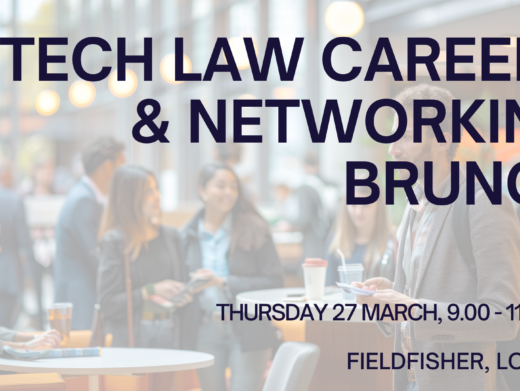Just before the SCL members filtered into the AGM on 28 January, I spoke to Roger Bickerstaff and Mark O’Conor about Roger’s period as Chair, the transition and the future priorities of the new Chair.
Roger has already reflected in his recent blog post on the achievements of his three years as Chair of SCL. He has been able to make real progress in building greater links with the in-house legal community. He has also seen through the outstanding success of the Foundations of IT Law, creating a structured development programme for people who are interested in becoming Tech lawyers, and a number of other initiatives aimed at more junior lawyers. Roger has retired as Chair of SCL but a testament to his success in helping SCL build on its international profile is that he is now President of IFCLA, the International Federation of Computer Law Associations.
Despite his achievements, Roger hands over with some reservations about SCL’s unfulfilled potential, which says quite a lot about the level of his ambitions for SCL. As he observed, the role of the Tech lawyer is now so much broader than it once was with relevant legal issues intertwined in so many aspects of normal life. Roger recalls a time when only the most senior lawyers had a computer, set on a plinth behind the desk – a precious and separate entity with an almost sacred value that could only be dealt with by the high priests/technology experts in white coats. Now that the computer is ubiquitous, the potential role for Tech lawyers has grown massively – arguably that creates an opportunity and a duty to make the law relevant and understandable.
The handover of the position of Chair has a slight twist. Mark O’Conor was formerly Roger’s trainee at Bird & Bird and they worked together until 2004. They remain good friends, despite Mark’s move ‘to the dark side’ (Mark’s own jesting description of his shift to DLA Piper). So it is not surprising that Mark’s first reaction to my questions about his future plans is to praise Roger’s achievements, highlighting the Foundations Programme, and to forcefully emphasise the need to protect those advances that have been made over the last three years. He sees the transition as a case of handing on the baton – they are both part of a relay team and it is his time to run full pelt.
Mark sees SCL as reaching out to members successfully through a number of different channels. He is a Twitter devotee and relies on SCL’s tweets a good deal. He will be tweeting himself as soon as his SCL Chair account is established but expects to lay a good deal of emphasis on communicating with SCL members in every way, continuing Roger’s regular emails to members. Mark has just emerged from a three-year ‘tour of duty’ as DLA Piper UK managing partner so communicating with large numbers is very much part of his skill set.
Mark ‘unashamedly, comes from a global law firm’ and a lot of his work is cross-border and multi-jurisdictional. While he and most SCL members will have many or most clients based in their home jurisdiction, the issues that confront tech lawyers in 2016 are increasingly global and demand some understanding of the interaction between jurisdictions. The option of being a local tech lawyer will quickly disappear and this gives SCL an opportunity to appeal to the international legal community. Mark sees a future of many more lawyers being qualified in more than one jurisdiction.
Both Roger and Mark will be focusing a great deal of time and energy over the coming months on June’s IFCLA Conference, hosted by SCL. The IFCLA Conference provides a springboard for SCL to add ‘international flavour’. But, even beyond that Conference, Mark would love to see, say, a visiting professor from Brussels and a lawyer from Canada take part in the SCL data protection update. That would give the UK lawyer, whether a 25-year-old or a 55-year-old, a valuable counterpoint.
Mark’s second area of concentration relates to SCL’s relationship with students. Building on our connection with IT law students, SCL can reach into computer studies faculties and make them aware of our existence – and, as Roger interjected, make them aware of the existence of tech law. That’s one important aspect of SCL’s charitable objectives though, as Mark points out, it is a two-way street. He thinks that anyone applying for a training contract and declaring an interest in tech law, would surely want to be able to say that they are already an SCL member.
Mark is wary of the success of the Foundations Programme modules obscuring the need for SCL to continue to serve its main membership. He wants to see experienced members offered events that will further develop their knowledge – master classes which assume a good level of knowledge among those already well versed in the jargon but which build upon that expertise. Look out for some high-level roundtable events at a law firm near you!
In summary, Mark sees ‘three prongs’ to the additions he hopes to see to SCL’s current successful programmes: an increasingly international focus, a renewed involvement with students and a masterclass opportunity.




